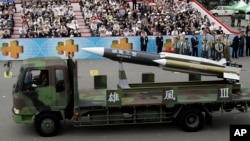At least two officers suspected in the deadly misfiring of a supersonic anti-ship missile Friday in Taiwan face court hearings as the island’s neighbor and militarily powerful rival China demands an explanation.
Two petty officers face charges of causing death due to negligence on the job and may be indicted, as well, under military law for damaging weapons intended for combat. Another four to five military personnel, including superiors, may also be disciplined.
One of the officers is suspected of accidentally firing a homegrown Hsiung Feng III supersonic anti-ship missile Friday from a Navy corvette in a harbor near the southern Taiwan city Kaohsiung. The missile struck a fishing boat and killed its captain.
The officer was alone, acting against procedure, and the other should have been with him, navy officials believe. No superior officers were around and the missile was in the wrong launch mode, the officials say.
The missile flew north about 40 kilometers into the Taiwan Strait, which divides Taiwan from China. After 25 minutes, it hit the fishing boat. China is 160 kilometers from Taiwan at the nearest point.
Emergency meeting
Taiwan’s President Tsai Ing-wen called for emergency meetings on the matter on Saturday after an official from military rival China demanded an explanation. The head of Taiwan policy in Beijing said late Friday the incident would "severely impact" relations that have been increasingly strained over the past year.
Tsai disputes Beijing’s "one-China" precondition for dialogue, so the two sides have not talked since she took office May 20. The precondition requires that both sides see each other as part of a single country. Tsai’s predecessor had agreed to the condition, taking two-way ties to their strongest ever during the previous eight years.
China has seen self-ruled Taiwan as part of its territory since the civil war of the 1940s, rather than as a country. Beijing insists the two sides eventually unify, by force if needed, despite opinion polls in Taiwan showing people on the island prefer today’s degree of autonomy.
Leading concern
China is the top concern for Taiwan’s 300,000 active duty personnel and a reason for developing the homegrown missile program.
Beijing will probably take no obvious action because of the missile mishap, Taiwan legislator and political scientist Hsu Yung-ming said. The missile passed through an area close to Taiwan on the east side of the strait, easily missing China, he noted. Beijing also knows Taiwan has the anti-ship missiles, but the Chinese military, the world’s third most powerful, may reconsider its own preparedness, he said.
"They will at least be woken up to Taiwan’s military power and this [incident] will also make them in terms of future exercises in the Taiwan Strait become more fearful or more limited in their scope," Hsu said. "Whether their air routes frequently cross into the Strait, that’s something they will need to consider."
Taiwan's government agency in charge of China policy said it had notified Beijing of the incident Friday.




